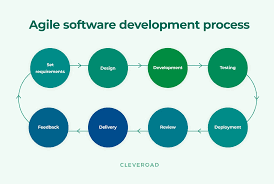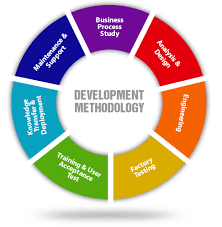The Benefits of Agile Software Development
Agile software development is a methodology that emphasizes flexibility, collaboration, and customer satisfaction. Unlike traditional software development methods that follow a strict plan, agile development allows for changes to be made throughout the process based on feedback and evolving requirements.
One of the key benefits of agile software development is its ability to adapt to changing needs. By breaking down projects into smaller increments, known as sprints, teams can quickly respond to new information and adjust their approach accordingly. This results in faster delivery times and a more responsive development process.
Another advantage of agile development is increased collaboration. By involving stakeholders throughout the project and encouraging open communication, teams can ensure that the final product meets the needs and expectations of the end users. This collaborative approach also fosters a sense of ownership among team members, leading to higher quality work and greater job satisfaction.
Agile software development also promotes transparency and visibility. With regular meetings, progress updates, and demonstrations of working software, stakeholders are kept informed every step of the way. This not only builds trust but also allows for early identification of issues so they can be addressed before they become major problems.
In conclusion, agile software development offers numerous benefits that make it an attractive choice for modern software projects. Its focus on flexibility, collaboration, and customer satisfaction results in faster delivery times, higher quality products, and greater stakeholder involvement. By embracing agile methodologies, teams can adapt to changing requirements more effectively and deliver value to their customers more efficiently.
9 Essential Tips for Effective Agile Software Development
- Encourage collaboration and communication within the team.
- Prioritize customer satisfaction and deliver working software frequently.
- Embrace changes in requirements even late in the development process.
- Focus on delivering a minimum viable product (MVP) early on.
- Ensure regular reflection and adaptation to improve efficiency.
- Empower teams to make decisions and self-organize.
- Use short iterations or sprints for incremental development.
- Implement continuous integration and testing for quality assurance.
- Encourage a culture of transparency, trust, and accountability.
Encourage collaboration and communication within the team.
Encouraging collaboration and communication within the team is a fundamental tip in agile software development. By fostering an environment where team members openly share ideas, feedback, and information, projects can benefit from diverse perspectives and collective expertise. Effective communication ensures that everyone is on the same page, minimizes misunderstandings, and promotes a sense of unity towards achieving common goals. Collaboration not only enhances productivity but also strengthens team dynamics, leading to better problem-solving and innovative solutions in the development process.
Prioritize customer satisfaction and deliver working software frequently.
In agile software development, it is crucial to prioritize customer satisfaction by delivering working software frequently. By focusing on meeting the needs and expectations of the end users, teams can ensure that the software they are developing adds value and addresses real-world challenges. Regularly delivering functional software not only keeps customers engaged and satisfied but also allows for continuous feedback and improvement throughout the development process. This customer-centric approach not only leads to higher-quality products but also fosters stronger relationships with clients, ultimately resulting in successful and impactful software solutions.
Embrace changes in requirements even late in the development process.
In agile software development, it is crucial to embrace changes in requirements even late in the development process. By remaining flexible and open to adjusting project requirements based on new information or feedback, teams can ensure that the final product meets the evolving needs of stakeholders. Embracing changes late in the development process allows for a more responsive and adaptive approach, ultimately leading to a higher quality end product that better aligns with customer expectations.
Focus on delivering a minimum viable product (MVP) early on.
In agile software development, it is crucial to focus on delivering a minimum viable product (MVP) early in the project. By prioritizing the core features that are essential for the product to function and provide value to users, teams can quickly get a working version of the software into the hands of stakeholders for feedback. This iterative approach allows for rapid validation of ideas, identification of key requirements, and adjustments based on real-world usage data. Ultimately, focusing on delivering an MVP early on in the development process enables teams to streamline decision-making, reduce time to market, and ensure that the final product meets user needs effectively.
Ensure regular reflection and adaptation to improve efficiency.
Ensuring regular reflection and adaptation in agile software development is crucial for improving efficiency. By taking the time to reflect on past practices and outcomes, teams can identify areas for improvement and make necessary adjustments to their processes. This continuous feedback loop allows for ongoing refinement of strategies, leading to increased productivity and better outcomes in the long run. Embracing a culture of reflection and adaptation not only helps teams stay agile and responsive to change but also fosters a mindset of continuous improvement within the organization.
Empower teams to make decisions and self-organize.
In agile software development, empowering teams to make decisions and self-organize is crucial for success. By giving teams the autonomy to determine how best to approach tasks and solve problems, they become more engaged, motivated, and effective in their work. This approach fosters a sense of ownership and accountability among team members, leading to increased collaboration, innovation, and overall productivity. When teams are empowered to make decisions and self-organize, they are better equipped to adapt to changing requirements and deliver high-quality software that meets the needs of stakeholders effectively.
Use short iterations or sprints for incremental development.
In agile software development, using short iterations or sprints for incremental development is a key strategy to ensure continuous progress and adaptability. By breaking down the project into smaller, manageable chunks, teams can focus on delivering working software in a timely manner while also incorporating feedback and making necessary adjustments along the way. This iterative approach not only helps in meeting deadlines more effectively but also allows for greater flexibility to respond to changing requirements and priorities.
Implement continuous integration and testing for quality assurance.
Implementing continuous integration and testing is a crucial tip in agile software development to ensure quality assurance throughout the development process. By automating the process of integrating code changes and running tests regularly, teams can quickly identify and resolve any issues that arise, leading to higher-quality software with fewer defects. This practice not only helps catch bugs early on but also promotes collaboration among team members, as they work together to maintain a stable codebase and deliver reliable software updates efficiently.
Encourage a culture of transparency, trust, and accountability.
Encouraging a culture of transparency, trust, and accountability is a crucial tip in agile software development. By fostering open communication and honesty within the team, members can freely share ideas, concerns, and feedback without fear of judgment. Building trust among team members promotes collaboration and ensures that everyone feels valued and respected. Additionally, holding team members accountable for their responsibilities helps maintain focus and drive towards achieving project goals. Overall, embracing transparency, trust, and accountability creates a positive work environment that leads to successful outcomes in agile software development projects.




